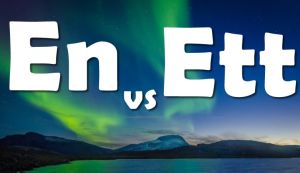Difference between revisions of "Language/Swedish/Grammar/When-use-Ett-or-En"
| Line 50: | Line 50: | ||
*Most of the nouns that end in -ad, -are, -dom, -else, -het, -ing, -ning, -ion, -ism, -lek, -nad, -or are en nouns. | *Most of the nouns that end in -ad, -are, -dom, -else, -het, -ing, -ning, -ion, -ism, -lek, -nad, -or are en nouns. | ||
*Most of the nouns that end in -ande, -ende, -ek, -em, -iv, -um are ett nouns. Names of continents, countries, provinces, towns are ett nouns | *Most of the nouns that end in -ande, -ende, -ek, -em, -iv, -um are ett nouns. Names of continents, countries, provinces, towns are ett nouns | ||
== More examples == | == More examples == | ||
Revision as of 18:25, 10 February 2023
Hej everyone 😀!
In today's lesson you will learn WHEN TO USE ETT & EN in Swedish.
In English, both articles "Ett" and "En" translate to "a" but when to use ett or en? Is there a grammatical rule to use?
NOUN FORMS
DEFINITE FORM
When we want a noun to be in definite form we add a suffix to the noun; -en, -n or -et.
For example:
- Ett bord = Bordet
- En hund = Hunden
- Ett äpple = Äpplet
- En skola = Skolan
Here we just add -n since the word already ends with a vowel.
As you might have noticed, you can know which suffix to use by looking at the indefinite article.
- If it's an "En-word", the suffix is -en or -n.
- If it's an "Ett-word", the suffix is -et.
INDEFINITE FORM
In Swedish, we have two words to choose when we want to write about nouns in an indefinite form: En or Ett.
Examples:
- Ett bord = A table
- En hund = A dog
- Ett äpple = An apple
- En skola = A school
IS THERE A GRAMMATICAL RULE?
Native English speakers often make the following mistake:
- En (Swedish article) = An (English article)
- Ett (Swedish article) = A (English article)
⚠ This rule is wrong!
→ There is no grammatical rule to know when to use En or Ett, you just simply have to learn them.
GOOD NEWS: THERE ARE SOME GUIDELINES
Yes! There are some guidelines that can help you to predict the gender:
- Most of the human beings and animals are en nouns. (Exceptions: ett barn, ett djur, ett bi, ett lejon).
- Days, months, seasons are en nouns (Exception: ett dygn).
- Most of the nouns that end in -ad, -are, -dom, -else, -het, -ing, -ning, -ion, -ism, -lek, -nad, -or are en nouns.
- Most of the nouns that end in -ande, -ende, -ek, -em, -iv, -um are ett nouns. Names of continents, countries, provinces, towns are ett nouns
More examples
- En bil (masculine): A car
- Ett hus (neuter): A house
- En bok (feminine): A book
- Ett barn (neuter): A child
- En hund (masculine): A dog
- Ett äpple (neuter): An apple
- En skola (feminine): A school
- Ett bibliotek (neuter): A library
- En stol (feminine): A chair
- Ett fönster (neuter): A window
- En cykel (masculine): A bicycle
- Ett träd (neuter): A tree
- En blomma (feminine): A flower
- Ett bord (neuter): A table
- En biljett (feminine): A ticket
- Ett kort (neuter): A card
- En dag (masculine): A day
- Ett år (neuter): A year
- En film (feminine): A movie
- Ett spel (neuter): A game
- En gata (feminine): A street
- Ett museum (neuter): A museum
- En kopp (feminine): A cup
- Ett husdjur (neuter): A pet
- En vän (feminine): A friend
Videos
